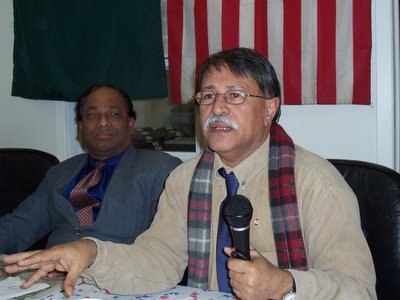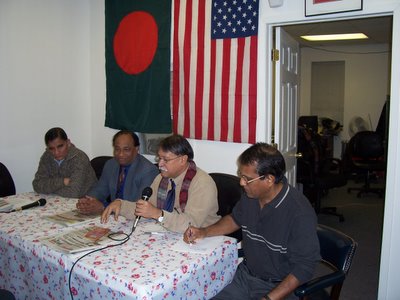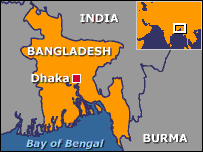SALEEM SAMAD
FOUR BANGLADESH doctors in a government hospital will face music after probe committee found the post-mortem report of flogging death of Hena Begum was deliberately doctored.
A probe document submitted to the High Court on Thursday reveals that fifteen-year-old Begum of a sleepy town in west Bangladesh was raped by her 40-year-old cousin. Days later the village elders and Mullahs of the mosque ordered 101 lashes following a Fatwa (religious edict) in local arbitration on January 24.
Hena Akhter could not survive after 70 blows and collapsed. She was hospitalized but died a week later, and her death was judged a suicide by a local government hospital.
An independent English newspaper Daily Star in a first page article on February 7 raised doubts about the autopsy report from the small towns, which prompted the court to issue directives the same day for exhumation of Begum's body and a fresh autopsy.
An initial autopsy report cited no injuries and deemed her death a suicide. Begum's body was exhumed on orders from the High Court and a second autopsy concluded that she had died from wounds "of a homicidal nature" on her scalp, abdomen, back, chest, arms and legs.
The girl child’s death provoked widespread outrage in Bangladesh, where punishments in the name of Fatwa were outlawed last July.
The High Court asked the government to indict the doctors, including the civil surgeon of Shariatpur district, where Begum had lived, for preparing a "false post-mortem report to hide the real cause of her death."
The report stated that the doctors of Shariatpur General Hospital and district Civil Surgeon are “equally” guilty for deliberately not mentioning the injury marks on Begum's body. “The civil surgeon's negligence in preparing the autopsy report has been proved which is against medical ethics,” the report said.
Meanwhile, the police chief recommends departmental actions against two police officers who were accomplice of false investigation report.
"What sort of justice is this? My daughter has been beaten to death in the name of justice. If it had been a proper court then my daughter would not have died," Dorbesh Khan, Begum's father, reportedly said at the time. [ENDS]
Saleem Samad, an Ashoka Fellow is an award winning investigative journalist based in Bangladesh. He specializes in Jihad, forced migration, good governance and politics. He has recently returned from exile after living in Canada for six years. He could be reached at saleemsamad@hotmail.com
Thursday, March 31, 2011
Wednesday, March 30, 2011
Government opts for respectable exit for Yunus, while global support pours
SALEEM SAMAD
AT THE time when Bangladesh government softened their reactive mood and have described that the ball is in Nobel laureate Professor Muhammad Yunus court, more global moral support pours in for the pioneer of banking the poor.
Two weeks ago a number of United States Senators and Congressman have expressed their concern over the humiliation faced by the international icon of microfinance.
A week ago Robert Blake, the visiting U.S. Assistant Secretary of State for South and Central Asian Affairs cautioned that if the Yunus issue remains unresolved, it will impact bilateral relations between Bangladesh and the United States.
The moral supports coincided with Bangladesh Supreme Court on Tuesday adjourned until April 4 the hearing on the petition filed by Muhammad Yunus seeking a stay order on the High Court judgment upholding his dismissal as the Grameen Bank managing director.
The central bank on March 2 removed the Nobel laureate from his position for allegedly flouting rules when he was reappointed in 1999. Yunus filed the petition against the order which the High Court had rejected earlier.
The unceremonious exit of Yunus has invited bricks and bouquets at home and globally. The government is embarrassed by blitzkrieg reaction from the press, politicians, celebrities and development practitioners.
Meantime a number of international microfinance organizations and civil society in Italy, Peru, Philippines and Pakistan have issued statements expressing support in solidarity with Prof. Yunus, founder of Grameen Bank.
Mario Baccini MP, President of the Italian Committee for Microcredit, Prof. Luisa Brunori of Bologna University, Sam Daley-Harris and European Member of Parliament Sylvia Cost said Prof Yunus with Grameen Bank have made significant mileage in social development in Bangladesh through microfinance. They are leading actors in the fight against poverty, writes private news agency United News of Bangladesh.
A statement of the Global Center for Development and Democracy (CGDD) and on behalf of President Alejando Toledo of Peru said “our organization, which cares about international development, has been following very closely the developments, and is very much concerned
about the progress which could be lost if the country’s leaders fail to appreciate what makes the Grameen Bank work.”
The statement further said that “If he (Toledo) becomes our next president, we expect to extend microloans to the poorest in our country in order to lift all Peruvians who are living below poverty conditions, out of it.”
Another letter to Prof Yunus from CARD MRI Family of Philippine said “our more than 1.5 million members and clients would like to assure you of our unwavering support to you as the Managing Director of Grameen Bank.”
An open letter from Kashf Foundation of Pakistan said Yunus and Grameen Bank are today global icons and torch-bearers for the mission to eradicate poverty, as well as to provide sustainable choices to poor households across the world.
It said the work of Grameen Bank has been replicated across 100 countries and has benefited over 170 million poor women globally. [ENDS]
AT THE time when Bangladesh government softened their reactive mood and have described that the ball is in Nobel laureate Professor Muhammad Yunus court, more global moral support pours in for the pioneer of banking the poor.
Two weeks ago a number of United States Senators and Congressman have expressed their concern over the humiliation faced by the international icon of microfinance.
A week ago Robert Blake, the visiting U.S. Assistant Secretary of State for South and Central Asian Affairs cautioned that if the Yunus issue remains unresolved, it will impact bilateral relations between Bangladesh and the United States.
The moral supports coincided with Bangladesh Supreme Court on Tuesday adjourned until April 4 the hearing on the petition filed by Muhammad Yunus seeking a stay order on the High Court judgment upholding his dismissal as the Grameen Bank managing director.
The central bank on March 2 removed the Nobel laureate from his position for allegedly flouting rules when he was reappointed in 1999. Yunus filed the petition against the order which the High Court had rejected earlier.
The unceremonious exit of Yunus has invited bricks and bouquets at home and globally. The government is embarrassed by blitzkrieg reaction from the press, politicians, celebrities and development practitioners.
Meantime a number of international microfinance organizations and civil society in Italy, Peru, Philippines and Pakistan have issued statements expressing support in solidarity with Prof. Yunus, founder of Grameen Bank.
Mario Baccini MP, President of the Italian Committee for Microcredit, Prof. Luisa Brunori of Bologna University, Sam Daley-Harris and European Member of Parliament Sylvia Cost said Prof Yunus with Grameen Bank have made significant mileage in social development in Bangladesh through microfinance. They are leading actors in the fight against poverty, writes private news agency United News of Bangladesh.
A statement of the Global Center for Development and Democracy (CGDD) and on behalf of President Alejando Toledo of Peru said “our organization, which cares about international development, has been following very closely the developments, and is very much concerned
about the progress which could be lost if the country’s leaders fail to appreciate what makes the Grameen Bank work.”
The statement further said that “If he (Toledo) becomes our next president, we expect to extend microloans to the poorest in our country in order to lift all Peruvians who are living below poverty conditions, out of it.”
Another letter to Prof Yunus from CARD MRI Family of Philippine said “our more than 1.5 million members and clients would like to assure you of our unwavering support to you as the Managing Director of Grameen Bank.”
An open letter from Kashf Foundation of Pakistan said Yunus and Grameen Bank are today global icons and torch-bearers for the mission to eradicate poverty, as well as to provide sustainable choices to poor households across the world.
It said the work of Grameen Bank has been replicated across 100 countries and has benefited over 170 million poor women globally. [ENDS]
Saleem Samad, an Ashoka Fellow is an award winning investigative journalist based in Bangladesh. He specializes in Jihad, forced migration, good governance and politics. He could be reached at saleemsamad@hotmail.com
Sexual abuse, exploitation of children in Bangladesh appalling
Lack of confidence of justice delivery system, sexual abuse and exploitation of children in Bangladesh skip prosecution
SALEEM SAMAD
CHILDREN IN Bangladesh are highly vulnerable to sexual abuse and exploitation, not only behind the closed doors of brothels but also in households, academic institutions and on the streets, revealed a UNICEF study on Tuesday.
Nearly 50 percent of the girls found engaged in prostitution had been sexually abused before joining the sex trade. The ‘slippery slope’ imagined from sexual abuse to prostitution to trafficking suggests a moral descent.
This study exposes the serious issue of sexual abuse of boys which has failed to be properly recognized in the past. Alarmingly, is that boys are becoming frequent clients of prostitutes.
Poverty-stricken Bangladesh boast of conservative culture, is an overwhelming Sunni Muslim majority where overtly speaking of sex is a social taboo.
The study made it clear that sexual abuse of children and their exploitation in prostitution derives from deep structural and societal problems coming from relationships between adults and children and how gender and sex are understood in a society of socio-economic inequality.
Most child sexual harassment cases in Bangladesh do not go for trial as the victims have no confidence in the justice delivery system. Efforts should be made to increase the number of prosecutions for sexual abuse of girls. Laws exist but the application is difficult, observed social anthropologist Therese Blanchet who conducted the study.
The study reveals that greater attention is given to ‘manage’ the dishonor and minimize social consequences while little support is offered to the traumatized person who is expected to silence her pain.
Despite the cultural limitation, the report recommends to introduce sex education in schools to prevent sexual abuse, stressed the need for strengthen employers’ responsibilities to prevent sexual abuse in the workplace.
Blanchet suggests that girls and adolescents engaged in prostitutions should be carefully looked at to improve ways to ‘recover’ and ‘reintegrate’ them back into the society.
UNICEF works for children's rights, their survival, development and protection calls for coordinated efforts to end both sexual abuse and commercial exploitation of children as child sexual abuse is widely ignored compared to commercial sexual exploitation and child trafficking. [ENDS]
Saleem Samad, an Ashoka Fellow is an award winning investigative journalist based in Bangladesh. He specializes in Jihad, forced migration, good governance and politics. He has recently returned from exile after living in Canada for six years. He could be reached at saleemsamad@hotmail.com
SALEEM SAMAD
CHILDREN IN Bangladesh are highly vulnerable to sexual abuse and exploitation, not only behind the closed doors of brothels but also in households, academic institutions and on the streets, revealed a UNICEF study on Tuesday.
Nearly 50 percent of the girls found engaged in prostitution had been sexually abused before joining the sex trade. The ‘slippery slope’ imagined from sexual abuse to prostitution to trafficking suggests a moral descent.
This study exposes the serious issue of sexual abuse of boys which has failed to be properly recognized in the past. Alarmingly, is that boys are becoming frequent clients of prostitutes.
Poverty-stricken Bangladesh boast of conservative culture, is an overwhelming Sunni Muslim majority where overtly speaking of sex is a social taboo.
The study made it clear that sexual abuse of children and their exploitation in prostitution derives from deep structural and societal problems coming from relationships between adults and children and how gender and sex are understood in a society of socio-economic inequality.
Most child sexual harassment cases in Bangladesh do not go for trial as the victims have no confidence in the justice delivery system. Efforts should be made to increase the number of prosecutions for sexual abuse of girls. Laws exist but the application is difficult, observed social anthropologist Therese Blanchet who conducted the study.
The study reveals that greater attention is given to ‘manage’ the dishonor and minimize social consequences while little support is offered to the traumatized person who is expected to silence her pain.
Despite the cultural limitation, the report recommends to introduce sex education in schools to prevent sexual abuse, stressed the need for strengthen employers’ responsibilities to prevent sexual abuse in the workplace.
Blanchet suggests that girls and adolescents engaged in prostitutions should be carefully looked at to improve ways to ‘recover’ and ‘reintegrate’ them back into the society.
UNICEF works for children's rights, their survival, development and protection calls for coordinated efforts to end both sexual abuse and commercial exploitation of children as child sexual abuse is widely ignored compared to commercial sexual exploitation and child trafficking. [ENDS]
Saleem Samad, an Ashoka Fellow is an award winning investigative journalist based in Bangladesh. He specializes in Jihad, forced migration, good governance and politics. He has recently returned from exile after living in Canada for six years. He could be reached at saleemsamad@hotmail.com
Tuesday, March 29, 2011
Sitangshu Guha cry for religious freedom

 photo: discussion forum organised by Bangladesh Association of New York. I was flanked by (from the right) Mohammed Ali Siddiqui, senior journalist, Dr Mohsin Ali, president Bangladesh Human Rights Watch, and Sitangshu Guha, leader of Gatak Dalal Nirmul Committee
photo: discussion forum organised by Bangladesh Association of New York. I was flanked by (from the right) Mohammed Ali Siddiqui, senior journalist, Dr Mohsin Ali, president Bangladesh Human Rights Watch, and Sitangshu Guha, leader of Gatak Dalal Nirmul Committee It was snowing on Sunday morning. Braving bad weather the meeting organised by Bangladesh Association of New York was well attended.
The discussion forum attended by Bangladeshi-American were mostly dissidents, or critical of the government's policy.
The meeting was organised by my good journalist friend, a social justice activist Sitangshu Guha on 4 December 2005. This was my first interaction with Bangladeshi-American in New York.
ModerIn the discussion spoke mostly dealing on religious freedom, Muslim jihadi, Islamic militancy, my ordeal with the dreaded military intelligence (DGFI), press freedom and current political development in Bangladesh.
Sitangshu left Bangladesh several years ago due to increasing economic and social insecurity as religous minority.
I met him after ages at a seminar on religious freedom in Bangladesh at Concordia University, Montreal last winter.
He is an activist on religious freedom with focus on persecution of Hindus, Ahmadiyyas Muslims, Christians & Buddhists in Bangladesh.
He systematically lobbies with US & European policymakers, human rights networks, media and civil societies to pressure on Bangladesh Islamic nationalists chauvinist government in a bid to halt persecution of religious and ethnic national minorities.
Alas he will never be able to return to Bangladesh for "fear of persecution" by security agencies. He is an outspoken activist about religious freedom in Bangladesh, now he is speaking against rising Islamic radicalism, which threatnes the basic principles of secularism and democracy.
I often wonder why the rights activists does not demand to lift impunity of the perpetrators engaged in crime against humanity. Some of the perpetrators who served the Bangladesh army and law enforcing agencies are presently immigrants in USA, Canada, Australia, New Zealand and Europe.
Canada has recently began investigating immigrants and refugee claimants under "War Crimes & Crime Against Humanity, 2000" [see separate blog]
I am myself, a journalist and researcher on social conflicts and a witness to persecution & ethnic cleansing of ethnic hill people in Chittagong Hill Tracts (CHT) in south-east Bangladesh during 1980-1991 by the Bangladesh anti-insurgency troops.
My articles were published on systematic persecution, genocide, and sexual abuse of women. In reality the military unleashed a reign of terror in CHT for two decades and committed series of crime against humanity.
That is a different issue, I will discuss that in a separate forum. Meanwhile I will begin a semi-official visit to New York and Washington from 3 December for 4-6 weeks.
Sitangshu Guha
sbguha@yahoo.com
sbguha@hotmail.com
sguha1@nyc.rr.com
For further studies on persecution of religious & ethnic minorities please visit: http://www.hrcbm.org/ http://web.amnesty.org/library/index/ENGASA130062001 http://web.amnesty.org/library/index/ENGASA130192004 http://web.amnesty.org/library/index/ENGASA130032004
Subscribe to:
Comments (Atom)






